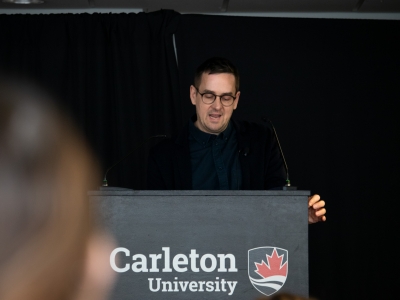FPA Researchers Work with CARE Canada to Improve Refugee Outcomes
When he was a graduate student at Oxford University, Political Science Professor James Milner was introduced to a tenet of research in refugee studies: research on human suffering is only ethically defensible if one of the objectives is to alleviate that suffering.
It’s a philosophy that continues in his work today. He recently spearheaded a partnership between researchers in FPA, York University, and the humanitarian organization CARE Canada. The agreement will allow graduate students to conduct research in CARE refugee camps in 17 countries, beginning this semester.
“The CARE staff see the issues every day. The research needs are obvious, but they don’t have the time or capacity to reflect on them in a comparative perspective,” explains Milner, who serves on the steering committee of Carleton’s Migration and Diaspora Studies Initiative. “Not only do we as researchers have the tools, but we have the ability to reflect on the broader context and then advise them.”
Offering advice to the CARE staff based on rigorously conducted research is an essential component of the agreement. The researchers plan to study the same policy in several camps and then discuss their comparative findings with the people on the ground, thereby influencing practice in the field.
The plan will also create unique opportunities for graduate students: “We have cohorts of gifted graduate students looking for good topics that aren’t just theoretically interesting, but very applied,” says Milner. “If grad students take slices of this very complex issue for their own projects, all of that can be woven together into a fabric used to find a solution.”
Carleton’s first graduate student to take advantage of the opportunity will be Katie Durvin, a TD Fellow in Migration and Diaspora Studies and a master’s student at NPSIA. She will be studying the implementation of standards to ensure the sexual and reproductive health of refugees and internally-displaced persons in the African country of Chad.
“During my time in Chad, CARE will support the logistics and coordination of my field visits to camps and settlements as well as interviews with officials,” says Durvin, who will conduct fieldwork in May. “Having the chance to partner with one of the leading non-governmental organizations involved in humanitarian response and benefit from their guidance and in-country experience is a truly exceptional opportunity.”



